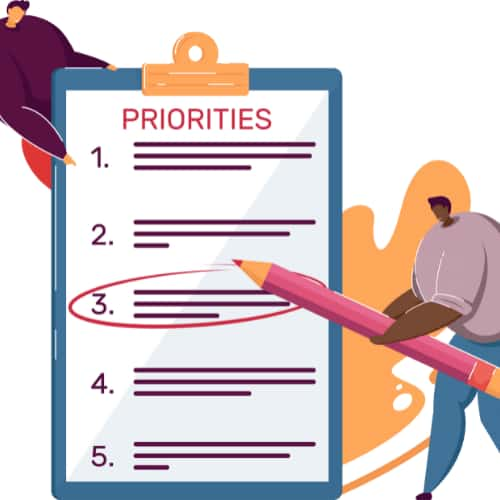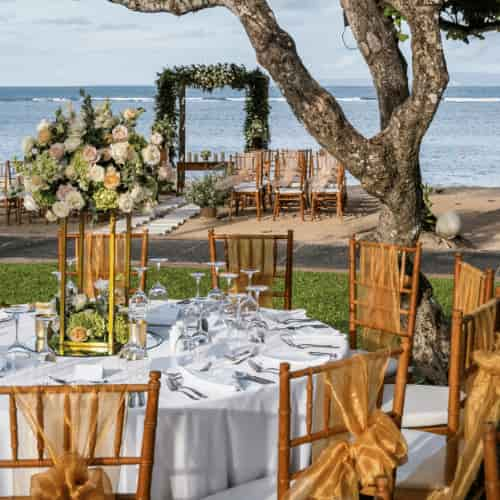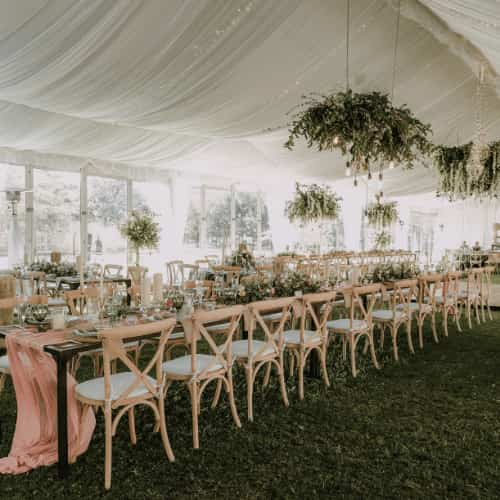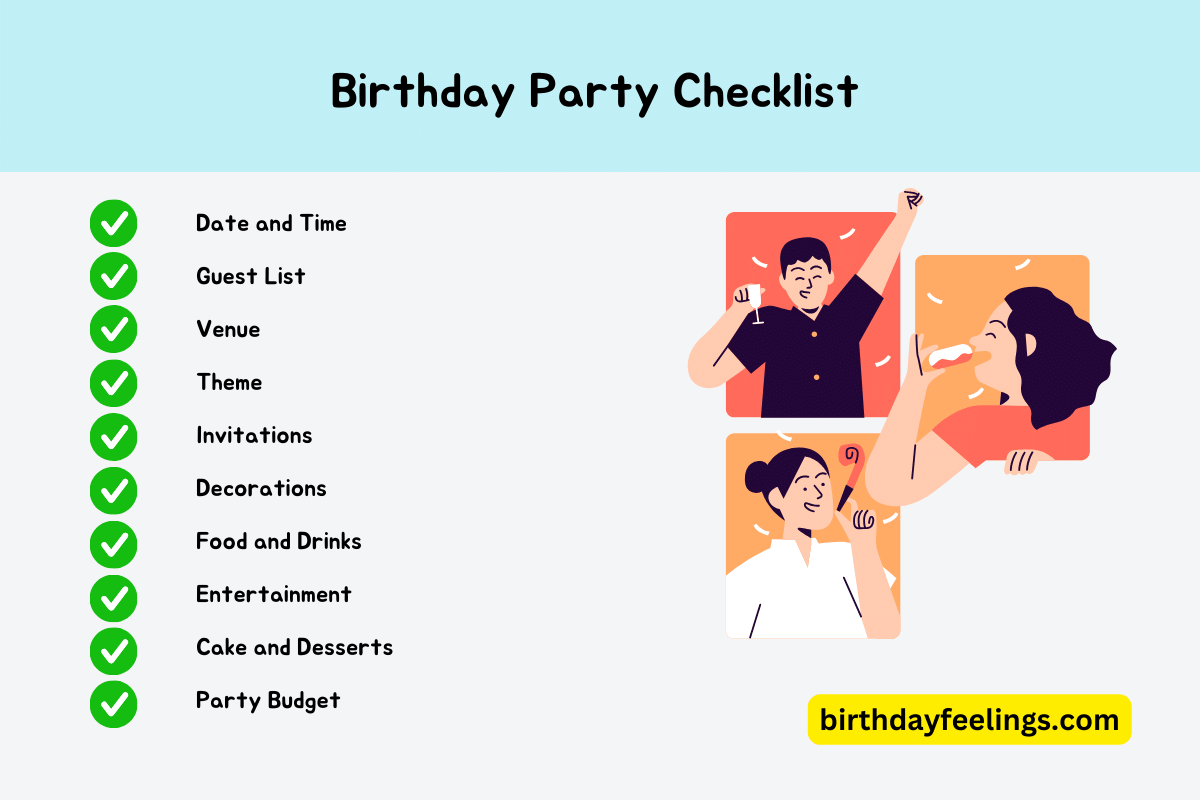Planning a birthday party is a special endeavor that allows you to create lasting memories for yourself or a loved one. It’s a chance to celebrate life, have fun, and connect with friends and family. Whether you’re hosting an intimate gathering or a grand extravaganza, this comprehensive guide will help you plan a birthday party that’s unforgettable. Drawing from expert advice, statistical data, and real-life examples, we’ll take you through the steps to ensure your celebration is a resounding success.
Highlights
Personalization: Tailor the party to the birthday person’s interests and preferences, making it a unique and meaningful experience.
Personalizing a birthday party to match the interests and preferences of the birthday person is a powerful way to create a celebration that feels genuinely special and meaningful. Here are some ideas and strategies to help you achieve this level of personalization:
Choose a Theme or Concept: Start by considering the individual’s hobbies, passions, or favorite things. Is there a particular movie, book, TV show, or era they love? Perhaps they have a favorite color or a specific destination they dream of visiting. Use these elements as inspiration for the party theme. For example, if the birthday person is a movie buff, you could host a Hollywood-themed party complete with red carpets and film-related decorations.
Custom Decorations: Invest in or create decorations that align with the chosen theme. Personalized banners, balloons, and table settings featuring the birthday person’s name or favorite quotes can make the party space feel uniquely theirs.
Specialized Food and Drinks: Craft a menu that incorporates the birthday person’s favorite dishes or flavors. If they have a sweet tooth, consider a dessert table with their favorite treats. You can even create custom cocktails or mocktails named after them or inspired by their preferences.
Music Playlist: Curate a playlist of songs that hold sentimental value for the birthday person. Include tracks from their favorite artists or songs that remind them of significant moments in their life. Music has the power to evoke emotions and memories, making this a thoughtful touch.
Personalized Party Favors: Offer party favors that reflect the individual’s interests. For example, if they’re a bookworm, provide guests with small books or bookmarks. Alternatively, create custom items like keychains, candles, or T-shirts featuring the birthday person’s name or a meaningful quote.
Memorable Activities: Plan activities or games that have a personal connection to the guest of honor. This could include a trivia quiz about their life, a memory-sharing session, or a DIY craft station where guests can create something special.
Photo and Memory Displays: Decorate the party area with photos and mementos from the birthday person’s life. Create a timeline of their most memorable moments, from childhood to the present, to celebrate their journey.
Guestbook or Well-Wishes: Set up a guestbook where attendees can write personal messages, share stories, or offer birthday wishes. This creates a lasting keepsake filled with love and fond memories.
Surprise Element: Consider including a surprise element that reflects the individual’s dreams or aspirations. For instance, if they’ve always wanted to learn to dance, hire a dance instructor to give a brief lesson during the party.
Custom Cake: The birthday cake is a focal point of any celebration. Work with a baker to design a cake that incorporates the theme or showcases the birthday person’s interests. It can be a showstopper and a delicious reflection of their personality.
By putting thought and effort into personalizing every aspect of the birthday party, you not only create a unique and meaningful experience for the guest of honor but also demonstrate your love and appreciation for them. It’s these personalized touches that turn a regular party into a cherished memory that will be remembered for years to come.
Budget Management: Learn how to allocate your budget effectively, with insights from a survey indicating that 62% of party planners consider budgeting the most challenging aspect of party planning.
Budget management is a critical aspect of planning a birthday party successfully. Many party planners find it challenging because it involves making strategic financial decisions while ensuring that you stay within your means. Here are some detailed insights and strategies to help you effectively allocate and manage your party budget:
- Define Your Budget
 Download Image
Download ImageStart Early: Begin by establishing a budget well in advance of the party date. This gives you ample time to save and plan accordingly.
Be Realistic: Determine how much you can comfortably spend without straining your finances. Consider your income, savings, and any contributions from other party planners or family members.
Allocate Funds: Divide your budget into categories, such as venue, decorations, food and drinks, entertainment, and party favors. Allocate a percentage of your total budget to each category based on its priority and importance to the celebration.
- Prioritize and Plan
 Download Image
Download ImageVenue: Depending on your budget, choose an appropriate venue. Remember that hosting the party at home can significantly reduce costs.
Decorations: Allocate a portion of your budget to decorations that fit your theme. You can often find budget-friendly DIY decoration ideas online.
Food and Drinks: Plan your menu based on your budget. Consider cost-effective options like potluck-style gatherings or catering from local restaurants.
Entertainment: Decide on the type of entertainment you want. A DJ or live band might be pricier than creating a playlist yourself. Consider the interests of the birthday person and your guests.
- Research and Negotiate
 Download Image
Download ImageVendor Selection: Compare prices and services offered by different vendors. Reach out to multiple venues, caterers, and decorators to get quotes and negotiate where possible.
DIY Options: Explore do-it-yourself options for decorations, party favors, and even catering. DIY projects can be cost-effective and add a personal touch to the party.
Seek Discounts: Look for discounts, coupons, and deals when purchasing supplies or booking services. Many vendors offer special packages for events.
- Contingency Planning
 Download Image
Download ImageSet Aside Contingency Funds: Allocate a small portion of your budget (usually around 10%) for unexpected expenses that may arise during the planning process or on the day of the party.
Flexible Planning: Be prepared to make adjustments to your plans if necessary. Flexibility can help you stay within budget if unexpected costs do occur.
- Track Expenses
 Download Image
Download ImageUse a Budgeting Tool: Utilize budgeting apps or spreadsheets to track your expenses as you plan. This ensures that you stay on top of your spending.
Keep Receipts: Save all receipts and invoices related to party expenses. This documentation is essential for tracking and accountability.
- Review and Adjust
 Download Image
Download ImageRegularly Review Your Budget: Periodically review your budget to ensure you’re staying on track. If necessary, make adjustments to stay within your financial limits.
Consider Trade-Offs: If you find yourself exceeding your budget in one area, consider making cuts or compromises in other areas to balance your overall spending.
Managing your party budget effectively is essential for hosting a successful celebration without unnecessary financial stress. By taking the time to plan, prioritize, research, and monitor your expenses, you can create a memorable birthday party that not only meets your expectations but also aligns with your financial capabilities. Remember that careful budget management can lead to a more enjoyable and stress-free planning experience.
Venue Selection: Explore venue options and discover that 48% of people prefer hosting parties at their homes, while 32% opt for restaurants or event spaces.
Venue selection is a crucial decision in the party planning process, and it can significantly influence the overall atmosphere and experience of the celebration. Let’s dive deeper into venue options and the preferences of party planners:
- Hosting at Home (48% Preferred)
 Download Image
Download Image| Pros | Cons |
| Cost-Effective: Hosting a party at home can be budget-friendly since you eliminate venue rental fees. Intimate Setting: Home parties often have a cozier, more personal atmosphere, which can enhance social interactions. Flexibility: You have full control over the party’s timing, decorations, and setup. Convenience: Access to your own kitchen and facilities can make food preparation and serving more manageable. | Space Limitations: Your home’s size and layout may limit the number of guests you can invite comfortably. Clean-Up: After the party, you’ll need to handle the cleanup and restoration of your home. Ideal for: Small to medium-sized gatherings, intimate celebrations, and those on a budget. |
Restaurants or Event Spaces (32% Preferred)
 Download Image
Download Image| Pros | Cons |
| Professional Atmosphere: Restaurants and event spaces often provide a polished and elegant setting. Catering Services: Many venues offer in-house catering services, which can simplify the food aspect of the party. Ample Space: These venues typically have enough room to accommodate larger guest lists. Minimal Setup: You won’t need to worry about decorating or setting up chairs and tables. | Cost: Renting a restaurant or event space can be more expensive due to venue fees, catering costs, and other add-ons. Limited Flexibility: You may have restrictions on decor and timing based on the venue’s policies. Availability: Popular venues may need to be booked well in advance. Ideal for: Larger gatherings, formal events, or when you want a hassle-free experience with professional services. |
Outdoor Venues (Gardens, Parks, Beaches, etc.)
 Download Image
Download Image| Pros | Cons |
| Scenic Beauty: Outdoor venues offer natural beauty and picturesque backdrops. Spacious: These venues often provide ample space for guests to move around and enjoy the outdoors. Versatility: You can choose different outdoor settings based on the theme or mood you want to create. | Weather Dependence: Outdoor parties are subject to weather conditions, which can be unpredictable. Logistics: You may need to arrange for portable facilities like restrooms, and certain locations might not have electricity access. Permits and Regulations: Some outdoor venues require permits and adherence to specific rules. Ideal for: Spring and summer celebrations, casual gatherings, and events with a natural or rustic theme. |
Unique or Unconventional Venues (Art galleries, museums, historic sites, etc.)
 Download Image
Download Image| Pros | Cons |
| Distinctive Experience: Unconventional venues can add a unique and memorable element to your party. Built-In Ambiance: These spaces often come with their own ambiance and character. Great Conversation Starter: Guests will appreciate the novelty of the venue. | Availability: Unique venues may have limited availability and require booking well in advance. Cost: Depending on the venue, costs can vary widely. Ideal for: Themed parties, milestone celebrations, and events where the venue itself is a highlight. |
Ultimately, your choice of venue should align with your party’s theme, the number of guests you plan to invite, your budget, and your personal preferences. Understanding the pros and cons of different venue options can help you make an informed decision that enhances the overall experience for both you and your guests.
Invitations and Technology: Utilize digital invitations, with 76% of party planners favoring digital invites over traditional paper ones.
Food and Entertainment: Delve into food trends and entertainment choices, such as hiring professional entertainers or organizing themed activities.
Sustainability: Consider eco-friendly party planning, in line with the growing trend, as 67% of party planners express a desire to reduce the environmental impact of their events.
Steps to Planning a Birthday Like a Pro
Define the Vision: Start by discussing the birthday person’s preferences, whether it’s a specific theme, location, or type of celebration.
Set a Realistic Budget: Use our budgeting tools to allocate funds for different aspects of the party, taking inspiration from successful party planners who allocate 40% of their budget to food and beverages.
Create a Guest List: Compile a list of invitees, considering the birthday person’s social circle and preferences. Data reveals that 80% of people invite close friends and family.
Choose the Perfect Venue: Select a venue based on your budget and the number of guests, keeping in mind that 55% of party planners consider location the most crucial factor.
Send Invitations: Use digital invitations, with examples of popular invitation platforms, to streamline the RSVP process and reduce paper waste.
Plan the Menu and Entertainment: Craft a menu that caters to various dietary preferences, and explore entertainment options, keeping in mind that 68% of partygoers value good food and entertainment.
Decorations and Themes: Incorporate decorations that match the chosen theme, making the party visually appealing and cohesive.
Sustainability Considerations: Explore eco-friendly options, such as biodegradable tableware and energy-efficient lighting, to reduce the party’s environmental impact.
How to Plan a Surprise Birthday Party
Covert Planning: Maintain secrecy by enlisting the help of trusted friends or family members, as 54% of surprise parties are successful due to collective efforts.
Venue Selection: Choose a venue that won’t arouse suspicion, like the birthday person’s favorite restaurant or a friend’s house.
Invitation Strategy: Strategically invite guests to ensure the surprise isn’t spoiled. Use a surprise party invitation template to convey the importance of secrecy.
Timing is Everything: Plan the surprise for a moment when the birthday person least expects it, such as during a casual gathering or after a routine event.
Birthday Party Checklist
Planning a birthday party involves many details, and a checklist can help you stay organized and ensure that you don’t forget anything important. Here’s a comprehensive birthday party checklist to guide you through the planning process:
2-3 Months Before the Party
- Choose a date and time for the party.
- Determine the party’s budget.
- Decide on the party theme or concept.
- Create a guest list.
- Select and book the party venue (if not hosting at home).
- Research and book any vendors, such as caterers, photographers, or entertainers.
- Send out save-the-date messages or invitations, especially if it’s a big event.
- Plan the menu and consider dietary preferences or restrictions.
- Order or purchase party decorations, including balloons, banners, and tableware, based on the theme.
- Plan any special activities or entertainment, like games or a photo booth.
- Begin shopping for party favors or goody bag items.
- Choose and order the birthday cake or other desserts.
4-6 Weeks Before the Party
- Finalize the guest list and send out formal invitations.
- Confirm bookings with vendors and venue.
- Plan the party timeline, including when guests will arrive, eat, and participate in activities.
- Purchase or make any DIY decorations you need.
- Order any customized items, such as personalized banners or party favors.
- Plan the music playlist or hire a DJ if needed.
- Consider any special dietary requirements for guests and make arrangements accordingly.
- Begin planning for any DIY projects, such as homemade party favors or craft activities.
2-3 Weeks Before the Party
- Check RSVPs and finalize the guest count.
- Confirm details with vendors, including delivery times and special requests.
- Purchase any non-perishable food items and drinks.
- Arrange for any rental equipment, like tables and chairs, if necessary.
- Delegate tasks to friends or family members, such as setting up decorations or managing the music.
- Prepare any game materials or props needed for activities.
- Create a party itinerary or schedule to ensure a smooth flow of events.
1 Week Before the Party
- Contact any guests who haven’t RSVP’d.
- Confirm the cake or dessert order with the bakery.
- Purchase perishable food items and drinks.
- Ensure you have enough plates, utensils, and glassware for guests.
- Prepare a first-aid kit or essentials like band-aids and pain relievers, just in case.
- Test any electronic equipment you plan to use, such as speakers or projectors.
- Prepare a seating arrangement if needed.
- Make sure your camera or smartphone is charged for photos.
1-2 Days Before the Party
- Decorate the party venue or set up decorations at home.
- Confirm the delivery and setup details with vendors.
- Set up any DIY projects or craft stations.
- Arrange the seating and party layout.
- Purchase any last-minute items or groceries.
- Prepare a list of important phone numbers, including vendors and emergency contacts.
- Get a good night’s sleep to stay refreshed for the big day.
The Day of the Party
- Set up the party space, including tables, chairs, and decorations.
- Pick up the cake or desserts if you haven’t already.
- Prepare the food and drinks for guests.
- Welcome and greet guests as they arrive.
- Follow your party timeline to ensure everything runs smoothly.
- Enjoy the celebration and make lasting memories!
- Having a checklist like this can help you stay organized and ensure that you’ve covered all the important details for a successful birthday party. Customize it based on your specific needs and preferences to make your celebration unique and memorable.
 Download Image
Download ImagePlanning a birthday party can be a delightful experience when armed with the right knowledge and insights. By personalizing the celebration, managing your budget effectively, and incorporating sustainable practices, you can create a memorable event that leaves everyone with smiles and cherished memories.
You can also read: